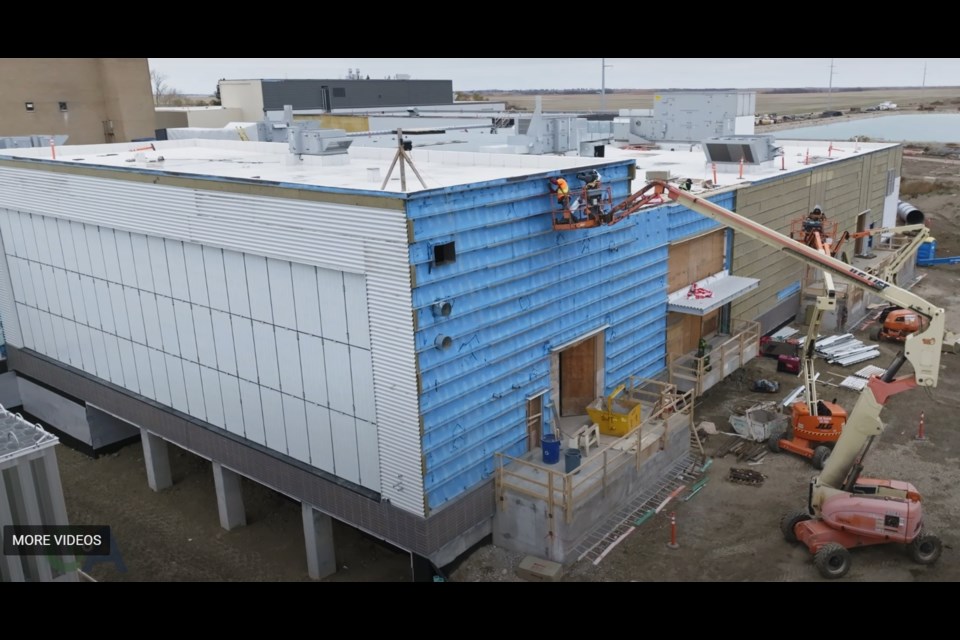MOOSE JAW — The Buffalo Pound Water Treatment Corporation (BPWTC) plans to increase water prices next year because the cities of Moose Jaw and Regina consumed less of the liquid this year.
The corporation charged $400 per megalitre this year for water rates but intends to increase that to $461.50/ML next year and then to $485/ML in 2026. Furthermore, it charged $361.50/ML for capital water rates this year but will increase that to $373.80/ML next year and then to $385/ML in 2026.
Ryan Johnson, president/CEO of the corporation, presented the organization’s mid-year — to Sept. 30 — report during city council’s recent executive committee meeting.
His report noted that water sales in 2022 and 2023 were below forecast, while the organization expected this year’s water sales to also be below budget. Also, while the corporation had reduced the water sales volume by 3.4 per cent, that decrease would be offset by increases in water rates.
The BPWTC had expected operating budget revenues to be $15.2 million this year, but lower volumes meant revenues declined by $900,000 to $14.3 million. Further, it had expected operating expenses of $15.2 million, but those declined by $500,000 to $14.7 million due to reduced chemical and electrical costs from lower sales volumes.
Therefore, the overall operating deficit this year is expected to be roughly $370,000, which would reduce the operating reserve from $900,000 to $530,000, Johnson said.
that is expected to generate 10 per cent — or about $200,000 — of the plant’s annual power consumption, he noted. As for utility expenses, the plant pays roughly $200,000 a month in the winter and about $230,000 in the summer, along with the carbon tax.
The Buffalo Pound Water Treatment Plan (BPWTP) has many new and expensive systems coming online soon, so while the water rates will increase significantly over the next two years, this was known from the start of the plant renewal project, Johnson said.
Moreover, higher capital water rates will offset the reduced water revenues, although residents won’t have to pay for any new capital projects over the next two years, the corporation president/CEO continued. Meanwhile, the corporation’s electrical rates will increase by pennies to cover its carbon tax expenses.
Johnson added that once the renewal project is completed and actual venue operational costs are known, the corporation will tie future rate increases to the consumer price index (CPI).
, and after 27 months, it was nearly 70 per cent completed but also five months behind schedule, said Johnson. There may be issues with how the water tastes in May or June if the contractor doesn’t meet certain schedules, but the corporation has been assured that the proper equipment should be installed by April.
The project should finish by March 2026, followed by a two-year validation period where plant staff will prove that everything works and that the plant can achieve its treatment requirements, he added.
When asked whether it was possible to reduce operating costs to address the reduced demand for water, Johnson replied that BPWTP has fixed and variable costs and very little wiggle room financially.
“Most of our costs are chemical and utilities. So we have to produce safe water, (and) that’s not an option, so we can’t reduce chemical consumption nor chemical usage … ,” he said, reiterating that future increases would be tied to CPI.
“We’re not doing anything fancy. We’re just trying to ensure that the plant meets the needs of the two cities … in the most efficient manner possible.”
Johnson added that the corporation would have the opportunity to find efficiencies in the new system during the validation process.
When asked about being five months behind schedule, Johnson said that the contractor is to blame and is demanding compensation from the BPWTC for phases that haven’t begun yet. He has learned from colleagues elsewhere in Canada that contractors are using this tactic regularly on similarly large projects.
Johnson added that both parties will likely go through dispute resolution to determine whether the contractor’s concerns are legitimate.




